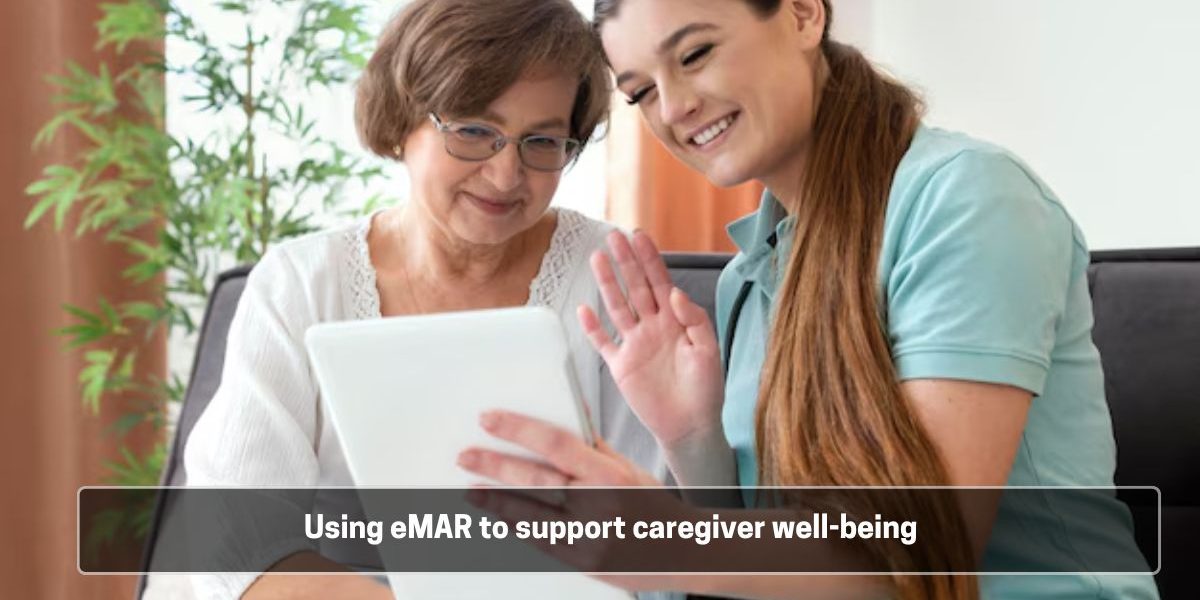Electronic Medication Administration Record (eMAR) systems have not only transformed patient care but also play a key role in supporting the well-being of caregivers. By streamlining medication management and reducing administrative tasks, eMAR systems help caregivers manage their workload more effectively, lower stress, and improve job satisfaction. Here’s how using an electronic MAR system can make a positive difference in their daily lives.
Reducing workload and streamlining tasks
Automated documentation
eMAR systems automate the documentation process, meaning caregivers spend less time filling out paperwork and more time caring for patients. For example, instead of manually recording each medication given, they can use a barcode scanner or quickly enter the information into the system. This not only saves time but also reduces the chances of making mistakes.
Simplified medication management
User-friendly eMAR systems make it easier to manage complex medication schedules. In care homes, where residents often have multiple medications at different times of the day, eMAR helps ensure that everything is organised and nothing is missed. This simplification makes their jobs easier and less stressful.
Minimising errors and boosting confidence
Real-time alerts and reminders
eMAR systems provide real-time alerts for medication schedules, ensuring that doses aren’t missed or duplicated. This is especially useful in busy care settings, where distractions are common. Knowing that the system will remind them about important tasks helps caregivers feel more confident and less worried about making mistakes.
Accurate record-keeping
eMAR systems reduce the risk of errors that can occur with manual data entry. This means caregivers can be more confident that the records they keep are accurate, which is crucial for patient safety and compliance. In an environment where errors can have serious consequences, this accuracy is a huge relief.
Improving communication and coordination
Centralised information
eMAR systems keep all patient information in one place, making it easy for the whole care team to access up-to-date records. This is particularly helpful in care homes where multiple caregivers might be looking after the same resident. Everyone can see what’s been done and what needs to be done, improving communication and teamwork.
Better collaboration
With shared access to accurate medication records, caregivers can work more effectively with doctors, nurses, and other healthcare professionals. This ensures that everyone is on the same page and working towards the best outcomes for the resident.
Enhancing training and professional development
Easy-to-use interfaces
eMAR systems are designed to be straightforward and user-friendly, which helps new staff get up to speed quickly.. A system that is easy to learn helps new caregivers feel comfortable and confident in their roles sooner.
Access to resources
Many eMAR systems come with built-in resources such as medication guides and best practice reminders. These tools help caregivers stay informed and continuously improve their skills, which benefits both them and their patients.
Supporting work-life balance
More efficient workflows
By reducing the time spent on documentation and making medication management easier, eMAR systems help caregivers complete their work more efficiently. This means they’re less likely to have to stay late to finish up paperwork, supporting a healthier work-life balance.
Remote access
Some eMAR systems allow caregivers to update records or review patient information remotely. This flexibility can be a big help in managing workloads and reducing stress, especially when unexpected changes occur.
By handling the complex parts of medication management, eMAR systems take a load off caregivers’ minds. This helps them feel less overwhelmed and more able to focus on the personal aspects of caregiving. This can improve job satisfaction and reduce feelings of burnout.
The well-being of caregivers has an impact on the quality of care they provide. When caregivers are stressed, overworked, or burnt out, they are more likely to make mistakes and less able to provide compassionate care. This can lead to serious issues, such as medication errors, and can affect the overall safety and well-being of residents in care homes. Ensuring caregivers are supported and able to perform their duties effectively is crucial for maintaining high standards of care and meeting regulatory requirements.







